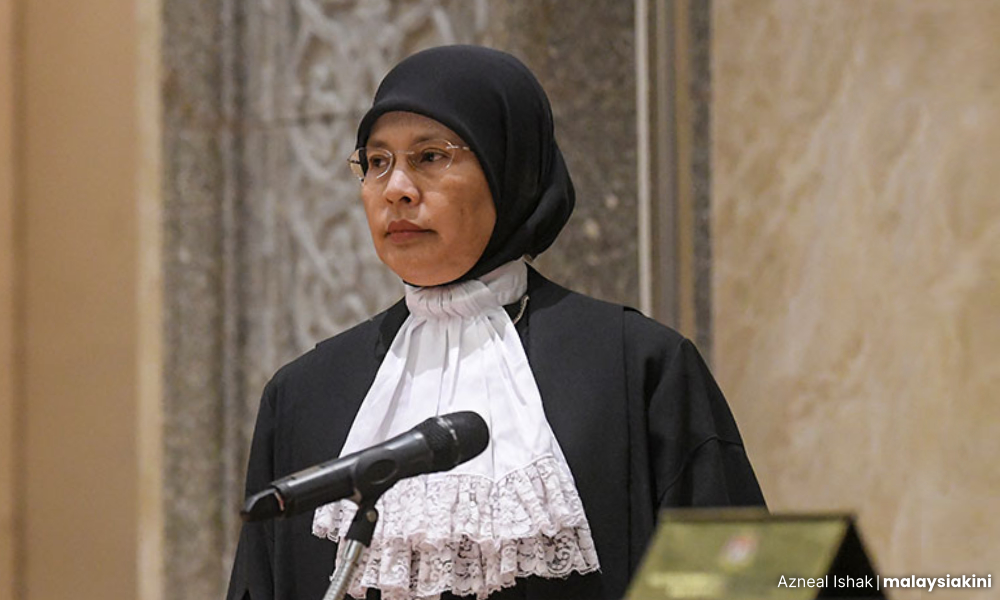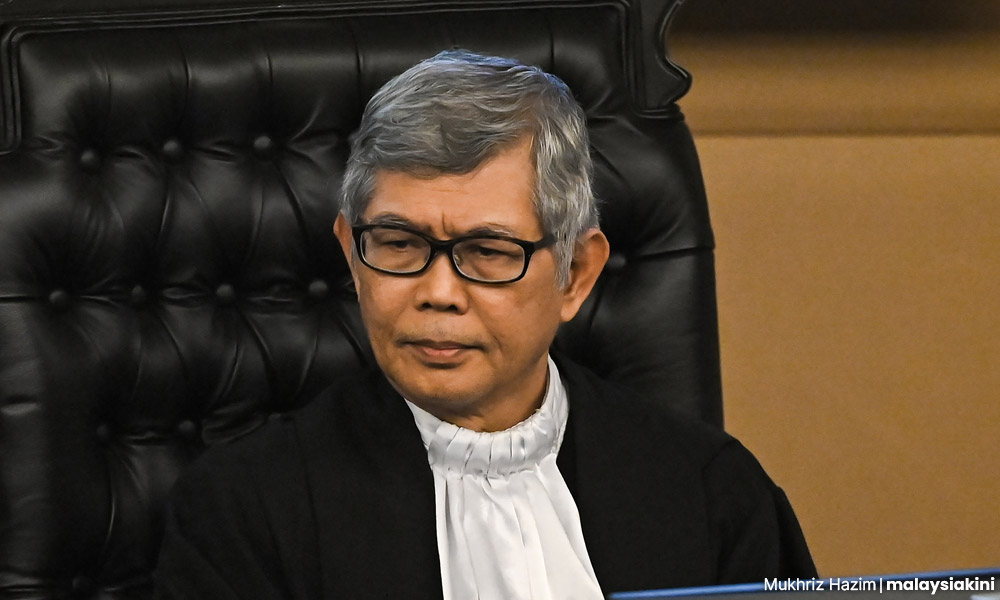


Apandi questions 'contradiction' in ex-CJ's interference claim, urges probe
Published: Jul 27, 2025 10:20 AM
Updated: 12:20 PM
Former attorney-general Apandi Ali has taken a swipe at a former chief justice, questioning whether there is a “disquieting contradiction” in her claim of interference.
Though he stopped short of mentioning names, his remarks were clearly directed at Tengku Maimun Tuan Mat, who retired on July 2 amid mounting criticism of the government’s decision not to extend her tenure.
Apandi (above) was responding to the allegation by retired chief judge of Sabah and Sarawak Abdul Rahman Sebli, who claimed he was pressured by a “very senior member of the judiciary” to change his judicial opinion in a case involving a travel ban challenge by former MP Maria Chin Abdullah.
“Despite the pressure, he stood firm, and the Federal Court ruled narrowly in favour of the government.
“However, the decision was later overturned by a three-judge panel - a rare and controversial move. Observers questioned whether the minority dissent had orchestrated a review to impose a preferred outcome.
“The irony? The very individual who decried judicial interference may have contributed to it internally,” he added in a statement to Malaysiakini.

Emphasising that justice must not be selectively applied, Apandi called for a probe into the allegations, noting that all judges must be held to the same standard regardless of position or past acclaim.
“The allegations made by Rahman are not mere gossip - they demand urgent and impartial investigation. Authorities must verify the authenticity of the communication received by Rahman and determine whether ethical boundaries were crossed and influence improperly wielded.
“Even in retirement, former judicial figures remain accountable. If misconduct occurred, corrective measures - including disciplinary or criminal proceedings - must follow to preserve public confidence and the legitimacy of past judgments. Where necessary, cases decided under suspect conditions should be revisited,” he added.
Judicial independence
Apandi also referred to the leaked minutes of a purported Judicial Appointments Commission (JAC) meeting, which alleged external interference in judicial affairs. If true, he said, the revelations would expose “glaring hypocrisy”.
He further highlighted Tengku Maimun’s earlier controversial comments calling for the removal of the prime minister’s role in judicial appointments, framing them as inconsistent with the claims now being made.

Former chief justice Tengku Maimun Tuan Mat
“Judicial independence isn't just about resisting political pressure - it’s also about ensuring integrity from within. Rahman’s account of internal peer pressure paints a troubling picture: even senior judges feel coerced into conformity by those at the top.
“If substantiated, these allegations represent a betrayal of public trust and a collapse of the impartiality expected of the judiciary’s highest office.
“Even more alarming is the former chief justice’s push to eliminate executive involvement in judicial appointments - raising the spectre of unchecked internal power that could morph into judicial autocracy,” he said.
Apandi also called for urgent reforms to prevent internal coercion, which included transparent panel assignment procedures, oversight of inter-judge communications during deliberations, strong whistleblower protections and tatutory penalties for undue influence within the judiciary.
“A legacy built on eloquent speeches and symbolic firsts means little if shadowed by inconsistency. If the judiciary is to remain a bastion of fairness, its leaders - past and present -must be held to the highest ethical standard. There can be no sacred cows, only sacred principles.
“Justice cannot thrive where accountability is optional. And independence means nothing if it is selectively applied,” he added.
Rahman’s allegation
Yesterday, Free Malaysia Today reported that Rahman, who stepped down as chief judge of Sabah and Sarawak on Thursday, made an allegation of being pressured.
“Judicial independence isn't just about resisting political pressure - it’s also about ensuring integrity from within. Rahman’s account of internal peer pressure paints a troubling picture: even senior judges feel coerced into conformity by those at the top.
“If substantiated, these allegations represent a betrayal of public trust and a collapse of the impartiality expected of the judiciary’s highest office.
“Even more alarming is the former chief justice’s push to eliminate executive involvement in judicial appointments - raising the spectre of unchecked internal power that could morph into judicial autocracy,” he said.
Apandi also called for urgent reforms to prevent internal coercion, which included transparent panel assignment procedures, oversight of inter-judge communications during deliberations, strong whistleblower protections and tatutory penalties for undue influence within the judiciary.
“A legacy built on eloquent speeches and symbolic firsts means little if shadowed by inconsistency. If the judiciary is to remain a bastion of fairness, its leaders - past and present -must be held to the highest ethical standard. There can be no sacred cows, only sacred principles.
“Justice cannot thrive where accountability is optional. And independence means nothing if it is selectively applied,” he added.
Rahman’s allegation
Yesterday, Free Malaysia Today reported that Rahman, who stepped down as chief judge of Sabah and Sarawak on Thursday, made an allegation of being pressured.

Retired chief judge of Sabah and Sarawak Abdul Rahman Sebli
Recalling the incident during his farewell speech in Kuching, Rahman said he was serving as a Federal Court judge at the time and had circulated a draft judgment to the six other judges on the bench.
"Not long after, I received an email from a very senior figure in the judiciary, telling me how wrong my interpretation of the constitutional issue was," he said.
Rahman noted that he was a relatively junior judge compared to those who sought to pressure him, and that the message implied he should fall in line with their views.
He suggested that those seeking more details about the case could consult the judgment, which had been published in a book launched earlier that evening.
Rahman emphasised that judicial independence involves more than just avoiding interference from the executive branch; it also includes resisting influence from fellow judges when carrying out judicial duties.
“Peer pressure can be a powerful force within the judiciary, potentially affecting judicial decisions and the overall administration of justice,” he said.
Malaysiakini has contacted Tengku Maimun for comment.
Recalling the incident during his farewell speech in Kuching, Rahman said he was serving as a Federal Court judge at the time and had circulated a draft judgment to the six other judges on the bench.
"Not long after, I received an email from a very senior figure in the judiciary, telling me how wrong my interpretation of the constitutional issue was," he said.
Rahman noted that he was a relatively junior judge compared to those who sought to pressure him, and that the message implied he should fall in line with their views.
He suggested that those seeking more details about the case could consult the judgment, which had been published in a book launched earlier that evening.
Rahman emphasised that judicial independence involves more than just avoiding interference from the executive branch; it also includes resisting influence from fellow judges when carrying out judicial duties.
“Peer pressure can be a powerful force within the judiciary, potentially affecting judicial decisions and the overall administration of justice,” he said.
Malaysiakini has contacted Tengku Maimun for comment.
***
Bar Council jangan buat ta'tahu
No comments:
Post a Comment